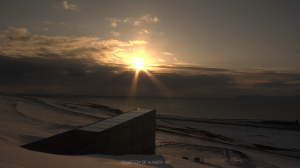‘Seeds Of Time:’ Inside the Noah’s Ark for Climate Change
)
“The Fate of Humankind Rests Upon These Genetic Resources”
On a hillside in Norway near the North Pole sits a large, angular vault jutting out of the mountain. It’s an area so cold there are literally signs warning of polar-bear crossings on the roads nearby. Inside this icy vault? Nearly a million types of seeds, frozen to be preserved for the next few thousand years.
Think of it as a Noah’s Ark for climate change, a way to preserve existing crops that could be lost in a warming world. The man who led the effort to create it, Cary Fowler, is the subject of a new film premiering at the SXSW Film Festival in Austin this week, called ‘Seeds of Time.’ I sat down with Fowler and the director of the film, Sandy McLeod, to hear more about it. Take a listen to our conversation:
Why Preserve Seeds?
Cary Fowler, Scientist: “There’s a huge diversity in seeds and varieties of different crops. And that diversity isn’t just nice and beautiful and tasty, but it’s also the essential resource for helping our agricultural crops adapt to whatever’s going to come tomorrow.”
Sandy McLeod, Director: “It’s sort of like having a toolbox for the genetics: heat resistance, or drought tolerance, or some of the other traits food will need to have in the future.”

Photo courtesy of 'Seeds of Time' Film
The Svalbard Global Seed Vault in Norway, where nearly a million seeds are being kept in a frozen state to prepare for climate change.
Why Put the Seed Bank Near the North Pole?
Cary Fowler, Scientist: “It’s pretty simple. To preserve seeds long-term, you freeze them. So you could do it in your freezer in the kitchen. But we do it in a little more orderly fashion. It’s the backup for everybody else. And of course, it’s unique because it’s inside of a mountain near the North Pole, where it’s deadly cold. It’s the most secure place in the world for this collection.”
What Comes Next?
Cary Fowler, Scientist: “I actually feel much more optimistic now [than I did thirty years ago]. And I can’t say that we’ve solved problems forever, but we’ve certainly made a start at it. And when I walk through the shelves of seeds down in the seed vault near the North Pole, I really do get a wonderfully optimistic, hopeful kind of feeling. I realize, gosh, you know, there are over 800,000 different varieties of crops that as far as I can tell are now actually safe and not going to follow their brethren into extinction.”
Sandy McLeod, Director: “I have to say, from making this film, I would have to admit that I’m probably more alarmed than I’ve ever been about food and how we treat it and how we deal with it. And the vault is a major accomplishment, but there’s so much more to be done. And that’s the thing I see ahead of us: How do we make agriculture sustainable? That’s a big question.”
You can catch ‘Seeds of Time’ this afternoon at the Long Center in Austin; information on additional screenings at the festival is available here.